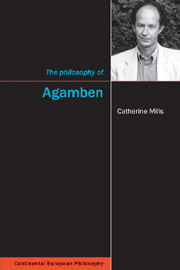Book contents
- Frontmatter
- Contents
- Acknowledgements
- Abbreviations
- Introduction
- 1 Metaphysics: negativity, potentiality and death
- 2 Aesthetics: language, representation and the object
- 3 Politics: biopolitics, sovereignty and nihilism
- 4 Ethics: testimony, responsibility and the witness
- 5 Messianism: time, happiness and completed humanity
- Conclusion
- Notes
- Chronology of major works
- Bibliography
- Index
Introduction
- Frontmatter
- Contents
- Acknowledgements
- Abbreviations
- Introduction
- 1 Metaphysics: negativity, potentiality and death
- 2 Aesthetics: language, representation and the object
- 3 Politics: biopolitics, sovereignty and nihilism
- 4 Ethics: testimony, responsibility and the witness
- 5 Messianism: time, happiness and completed humanity
- Conclusion
- Notes
- Chronology of major works
- Bibliography
- Index
Summary
Giorgio Agamben has become well known in recent years for his interventions in political theory, ethics and questions of law. Since the translation of his enigmatic work, The Coming Community, in 1993, English publication of his work has occurred at an ever-increasing rate. In the process, his complex and philosophically dense reflections on contemporary problems of sovereignty, biopolitics and ethics have transformed the terms of much of the critical discourse of radical theory. Terms such as sovereignty, the exception, biopolitics and life can scarcely be used today without reference to Agamben. Moreover, his approach to questions of language, subjectivity and representation has reoriented discussion away from the deconstructive approach that has largely dominated in the Anglo-American context of late. In doing so, it has lent these questions a new philosophical importance by recasting their status within the history of philosophy, and especially in relation to the perceived metaphysical propensity to found humanity on negativity alone. As such, his work has also helped to reopen questions of philosophical anthropology, contributing to a renewed interest in the distinction between animality and humanity.
Despite the critical interventions of his work, however, the concepts he develops and their philosophical importance remain obscure to many. This is in no small part because of the sheer complexity and difficulty of his work. There are several sources of this complexity, the first of which is simply its breadth of reference.
- Type
- Chapter
- Information
- The Philosophy of Agamben , pp. 1 - 8Publisher: Acumen PublishingPrint publication year: 2008

